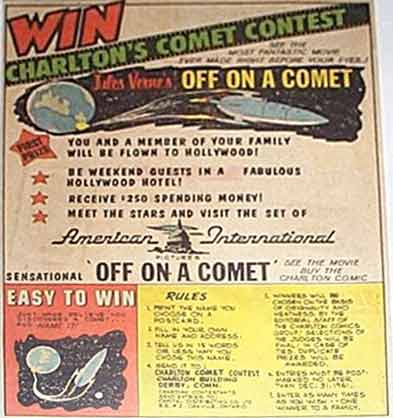by neufer » Sun Mar 08, 2009 12:07 am
apodman wrote:orin stepanek wrote:... I just wish there were more naked eye views (closer encounters) that came around.
The only trouble with that is a getting hit by a big one more often. Of course the big one isn't going to hit in my lifetime (probably) anyway, so go ahead and enhance the view - send some massive probes through the Kuiper belt and Oort cloud to perturb some of those lazy non-participating comets into fascinating Earth-grazing orbits. Or, to be safe, supplement the real comets digitally like the tv view of fireworks at the 2008 Olympics.

--------------------------------------
http://en.wikipedia.org/wiki/Off_on_a_Comet wrote:
<<Off on a Comet (French: Hector Servadac) is an 1877 science fiction novel by Jules Verne. The story starts with a comet that touches the Earth in its flight and collects a few small chunks of it. Some forty people of various nations and ages are condemned to a two-year-long journey on the comet. They form a mini-society and cope with the hostile environment of the comet (mostly the cold). The size of the 'comet' is about 2300 kilometers in diameter - far larger than any comet or asteroid that actually exists.>>
----------------------------------------
The 36 inhabitants of Gallia include a German Jew, an Italian, three Frenchmen, eight Russians, 10 Spaniards, and 13 British soldiers.
The main characters are:
* Captain Hector Servadac of the French Algerian army
* Laurent Ben Zoof, Servadac's aid
* Count Wassili Timascheff of Russia
* Lt. Procope, the commander of Timascheff's yacht, Dobrina
* Isaac Hakkabut, a German trader
* Nina
* Pablo
* Colonel Heneage Finch Murphy and Major Sir John Temple Oliphant of Britain's Gibraltar garrison.
* Palmyrin Rosette, the French discoverer of the comet and previously Servadac's teacher.
----------------------------------------
<<From the beginning Verne had problems with this novel. Originally he intended that Gallia would crash into the earth killing all on board. This may have been the motivation for his ghoulish and rather unfunny joke naming the hero "Servadac" with the mirror of the French word cadavres (="corpses"), predicting all would die on the "return". His publisher Hetzel would not accept this however, given the large juvenile readership in his monthly magazine, and Verne was forced to graft a rather unsatisfying ending onto the story, allowing the inhabitants of Gallia to escape the crash in a balloon.>>
----------------------------------------------------
http://en.wikipedia.org/wiki/Hector wrote:
<<When Hector (Ἕκτωρ, "holding fast") sees Achilles coming, he turns and runs three times around the walls of Troy, then makes his stand. Achilles stabs his spear through Hector's throat. After Hector died, Achilles then slit Hector's heels, and took the girdle that Ajax had given him and passed it through the slits of the heels. He then fastened the girdle to his chariot and drove [Hector's corpse] through the DUST to the [Greek] camp.>>
[quote="apodman"][quote="orin stepanek"]... I just wish there were more naked eye views (closer encounters) that came around.[/quote]
The only trouble with that is a getting hit by a big one more often. Of course the big one isn't going to hit in my lifetime (probably) anyway, so go ahead and enhance the view - send some massive probes through the Kuiper belt and Oort cloud to perturb some of those lazy non-participating comets into fascinating Earth-grazing orbits. Or, to be safe, supplement the real comets digitally like the tv view of fireworks at the 2008 Olympics.[/quote]
[img]http://www.julesverne.ca/images/imgjvmov/offonacomet_1961_contest.jpg[/img]
--------------------------------------
[quote=" http://en.wikipedia.org/wiki/Off_on_a_Comet "]
<<Off on a Comet (French: Hector Servadac) is an 1877 science fiction novel by Jules Verne. The story starts with a comet that touches the Earth in its flight and collects a few small chunks of it. Some forty people of various nations and ages are condemned to a two-year-long journey on the comet. They form a mini-society and cope with the hostile environment of the comet (mostly the cold). The size of the 'comet' is about 2300 kilometers in diameter - far larger than any comet or asteroid that actually exists.>>
----------------------------------------
The 36 inhabitants of Gallia include a German Jew, an Italian, three Frenchmen, eight Russians, 10 Spaniards, and 13 British soldiers.
The main characters are:
* Captain Hector Servadac of the French Algerian army
* Laurent Ben Zoof, Servadac's aid
* Count Wassili Timascheff of Russia
* Lt. Procope, the commander of Timascheff's yacht, Dobrina
* Isaac Hakkabut, a German trader
* Nina
* Pablo
* Colonel Heneage Finch Murphy and Major Sir John Temple Oliphant of Britain's Gibraltar garrison.
* Palmyrin Rosette, the French discoverer of the comet and previously Servadac's teacher.
----------------------------------------
<<From the beginning Verne had problems with this novel. Originally he intended that Gallia would crash into the earth killing all on board. This may have been the motivation for his ghoulish and rather unfunny joke naming the hero "Servadac" with the mirror of the French word cadavres (="corpses"), predicting all would die on the "return". His publisher Hetzel would not accept this however, given the large juvenile readership in his monthly magazine, and Verne was forced to graft a rather unsatisfying ending onto the story, allowing the inhabitants of Gallia to escape the crash in a balloon.>>[/quote]----------------------------------------------------
[quote=" http://en.wikipedia.org/wiki/Hector "]
<<When Hector (Ἕκτωρ, "holding fast") sees Achilles coming, he turns and runs three times around the walls of Troy, then makes his stand. Achilles stabs his spear through Hector's throat. After Hector died, Achilles then slit Hector's heels, and took the girdle that Ajax had given him and passed it through the slits of the heels. He then fastened the girdle to his chariot and drove [Hector's corpse] through the DUST to the [Greek] camp.>>[/quote]